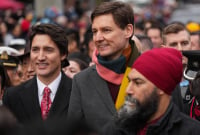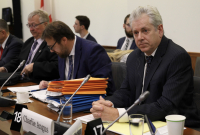Support strong Canadian climate journalism for 2025
The traditional wisdom in Canadian politics is that byelections don’t really matter. Perhaps, they are of some note to the local constituents who’ll find themselves with this or that representative. The general election is the big show; the rest is, for national purposes, a distraction. But politicians and their partisan hangers-on never miss an opportunity to use a political moment, however small, to spin a narrative.
Sometimes, those stories are the work of utter fabulists, but last night, two federal byelections told a plausible tale of Liberal Party woes.
First, in Elmwood-Transcona, the Liberals were never going to stand a chance. It was a two-way race between the New Democrats and the Conservatives, whose prospects in the riding have risen alongside party fortunes. The NDP has held the seat since the 1980s, save for a brief Tory stint from 2011 to 2015.
In 2021, Daniel Blaikie, who recently left the party to join Manitoba premier Wab Kinew, won Elmwood-Transcona by more than twenty points. Last night, Leila Dance won it for Jagmeet Singh’s side, but by a mere four points over the Conservatives, who rose nearly 16 points.
The Liberals, meanwhile, dropped just under ten points off their 2021 showing, managing just under five per cent of the vote – an absolute drubbing, though not their first in the riding.
In LaSalle–Émard–Verdun, the news for the Liberals was even worse, despite finishing a close second to the Bloc Québécois. The final tally had the Liberals behind just 0.8 per cent – or 248 votes. The Liberals under Prime Minister Justin Trudeau have held the riding since former justice minister David Lametti won it in 2015 – and in the last three general elections, they’ve won roughly 43 per cent of the vote each time. On Monday night, they dropped almost 16 points, losing what was previously an extremely safe riding.
The top-line takeaway from this week’s byelections is that the Liberals underperformed compared to past outings. While the contests are just two ridings – or three, if you count the June loss in Toronto-St. Paul’s – out of what will be 343 in the next election, they do stand in support of the broader data that shows the governing side way down in the polls and set to suffer a major defeat.
We will now fully enter the partisan psychological process of grief processing. This begins with denial and, for many, ends with denial. But some will come to realize that the preponderance of evidence and probability point to the opposition benches by the fall of next year, if not sooner.
In public and behind closed doors, there are coping mechanisms at work, prolonging the denial. Partisans will say voters will come around as the economy continues to improve (inflation is now at the Bank of Canada’s 2 per cent target, the lowest since the winter of 2021). But that won’t do it.
The more cynical partisans expect, even hope, that a Donald Trump victory in the United States presidential election will zap complacent progressives into action and that, somehow, will translate into enough votes for the Liberals to survive. That won’t do it either.
Some Liberals are even banking on recent news of Russian propaganda infiltrating Canada and implicating conservative influencers turning the tide. They’ll try their best to link the revelations to Pierre Poilievre and the Conservative Party, painting them as witting or unwitting Kremlin stooges. Nope, won’t work.
The Liberals have most likely passed the event horizon of voter tolerance. At nearly ten years in power, all of them with Trudeau as leader, a significant number of Canadians have become a mix-and-match of skeptical, angry, tired, frustrated, and ready for change. It’s a familiar cycle of grievance accumulation in Canadian politics. At some point, voters will blame the governing side for anything and everything, fairly or unfairly, substantive or superficial. It’s one of the costs of incumbency.
At the same time, Liberal politicians and staffers will continue to wear down in a job that grinds people into dust over the years. Veteran staffers move on. Seasoned members of Parliament and Cabinet call it a day. Institutional knowledge fades, and the person at the top does, too. Ten years as a prime minister is too long for any person to govern and for any population to be governed by them, especially in today’s media and social media landscape. There’s a reason no single person has managed to win four elections in a row since Wilfrid Laurier did it over a century ago in what was essentially a two-party system.
The poor Liberal performance in the last three byelections doesn’t doom them to failure, but does suggest that rumours of the party’s coming demise aren’t exaggerated. The byelections point to a problem and a probable outcome. In theory, there’s still time for the Liberals to turn things around. Cold fusion also works, in theory. But I don’t expect either to come to pass any time soon.






Comments
In the usual excitement around the next horse race, how on earth have ALL journalists and pundits managed to SO completely and SO irresponsibly ignore the current political context, which is that the leading "horse" (itself also involves ignoring how often polls are wrong) steadfastly denies science, INCLUDING the science of climate change?! EVEN when they also "report" with such dedicated zeal on its wholly predicted manifestations, i.e. one bona fide, real world catastrophe after another FFS?!
Not to even mention blatantly imitating (also with infuriating ZEAL) the avid subversion and skewing of the whole political process and therefore democracy itself, ALSO in completely oblivious lockstep with the certifiably insane GOP, thereby steamrollering the crucial, defining differences between our two systems!
And why on earth (truly and tellingly) are all pundits and journalists SO oblivious to how algorithmed they themselves obviously and irrationally ARE, and therefore how at the mercy of the resulting zeitgeist/bandwagon that has never more clearly resembled sharks in a feeding frenzy? WTF? Is the concept of incumbency/boredom REALLY the main issue under the unprecedented circumstances humanity is actually IN?
Is Justin Trudeau, a mere man, SO despicable as to deserve this relentless vilification?
Why does Rosemary Barton, lead political correspondent for CBC, feel free to remind him repeatedly in a public interview how much people don't "like" him?! Not to mention the impressive group of like-minded Liberals that HE has managed to attract, recalling again that we only speak of a "liberal" democracy, never a conservative one for a reason.
And are we REALLY all that anti-intellectual now, having so thoroughly and apparently unwittingly succumbed to the noxious, destructive conservative narrative now that Rhodes scholars from Oxford, Harvard graduates, and even university graduates generally are wholly indistinguishable from anyone else when it comes to governing Canada, a demonstrably, internationally successful and respected G7 country? As Duclos wildly understated in reply to David Cochrane's assault (et tu David?; you used to have a perspective) yesterday on "Power and Politics, "Governance is hard, especially of a G7 country; three-word slogans aren't enough."
So why in hell is everyone acting like the conservatives have ANYTHING else on offer?
To sum it up, under the circumstances, "if the Liberals are cooked," we're all cooked.
40% of Canada is Ontario. Under both Poilievre and Ford at the same time, I expect that another party will run out of tolerance there.
Alberta, you'd think the same, that Smith will quickly pall without Trudeau to oppose, since that's basically her whole act. But after growing up in Alberta and watching Klein get re-elected over and over as he tore away at the fabric, I cannot predict Alberta.